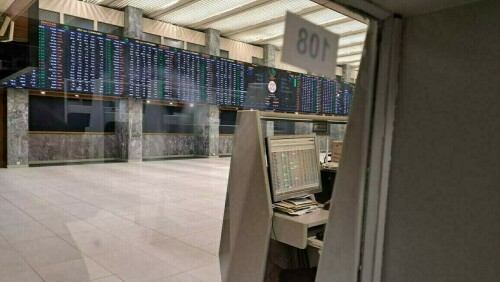PSX Plummets Amid Rising Regional Tensions
The Pakistan Stock Exchange (PSX) experienced significant selling pressure on Wednesday, with the KSE-100 Index declining by over 3% as escalating tensions between Pakistan and India impacted market sentiment.
The market remained bearish throughout the session, driving the index to an intra-day low of 110,631.84.
At the closing bell, the KSE-100 Index concluded the day at 111,326.57, a decrease of 3,545.61 points, or 3.09%.
The index had previously closed at 114,872.18 on Tuesday.
Heightened tensions between Pakistan and India, subsequent to the Pahalgam incident, have exerted downward pressure on the stock market since the preceding week.
Information Minister Attaullah Tarar issued a warning early Wednesday regarding a potential military strike by India on Pakistan within the next 24 to 36 hours.
“Pakistan possesses reliable intelligence indicating India’s intention to launch a military strike within the next 24 to 36 hours, utilizing the Pahalgam incident as a fabricated justification,” the minister stated during a press briefing and in a post on X.
Globally, stock performance was mixed on Wednesday, and oil prices decreased as concerns over a weakening economic outlook and unfavorable signals from corporations affected by tariffs imposed by Donald Trump counteracted optimism regarding a possible reduction in global trade tensions.
US Treasury yields also remained near multi-week lows as traders increased expectations of additional interest rate cuts by the Federal Reserve to bolster the world’s largest economy.
Despite Trump’s efforts to mitigate the impact of auto tariffs and indications of advancement in broader trade negotiations, specific details remain unclear. Commerce Secretary Howard Lutnick mentioned reaching one agreement with a foreign entity.
Further contributing to tariff concerns, investors were also dealing with worsening US economic data as Trump’s substantial tariffs affected businesses and consumers domestically.
Economic Outlook
“We are increasing the probability of a drawn-out period of economic stagnation in the months ahead, potentially fulfilling the criteria for a recession, to 50%,” commented David Kohl, Chief Economist at Julius Baer.



Comments (0)
No comments yet. Be the first to comment!
Leave a Comment